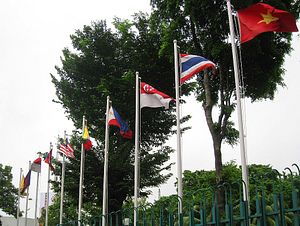Last week, ASEAN’s center for military medicine held an urgent consultation to discuss the region’s response to the coronavirus. The meeting spotlighted one part of the defense aspect of Southeast Asia’s ongoing response to the situation as well as the role of the new center within the region.
While the coronavirus originated in China, the cases emerging in neighboring Asian states have also attracted attention. Southeast Asia has been among the more vulnerable, given the subregion’s geographical proximity and links to China as well as the limited capabilities and governance problems evident in some ASEAN countries. And we have seen some of this at play in recent weeks, with both reported cases – including the first death outside of China in the Philippines – as well as bizarre comments by some Southeast Asian officials attracting headlines.
On the defense side, one of the outlets of Southeast Asia’s regional response to the coronavirus via the Association of Southeast Asian Nations (ASEAN) is the new ASEAN Center for Military Medicine (ACMM). The ACMM was launched in Thailand back in 2016 to drive cooperation among the medical services of the region’s militaries through various ways, including developing response plans, assessing needs in crisis situations, and conducting training and research in emergency medical services.
Last week, the ACMM was in the headlines with an engagement tied to the coronavirus. The ACMM held an urgent videoconference on the current regional situation on the coronavirus and potential steps that could be taken in response.
According to Vietnam’s defense ministry, the ACMM videoconference, held on January 28 at the Department of Military Medicine of the General Department of Logistics, was attended by medical representatives from Thailand, Indonesia, Brunei, Myanmar, Malaysia, Singapore, the Philippines, and Vietnam, and chaired by Major General Nguyen Xuan Kien, Director of the Department of Military Medicine.
Per a statement on the videoconference issued by the ministry, at the engagement, the participants discussed several subjects, including the importance of preventive measures and early admission and testing for those suspected of being infected as discussed by organizations such as the U.S. Center for Disease Control (CDC) and the World Health Organization (WHO). The ACMM had also previously announced a level-2 readiness condition (REDCON 2) and was closely tracking developments in ASEAN member states.
They also discussed how the coronavirus may affect some of Vietnam’s planned activities for its ASEAN chairmanship as well as ASEAN activities. For instance, Kien said that Vietnam had recommended exercises be held among states to cope with the virus and also encouraged the ASEAN Defense Ministers’ Meeting Plus expert group on military medicine to add similar activities to their working plan for the 2020-2023 period.
To be sure, the ACMM is only aspect of the defense side of Southeast Asia’s response to the coronavirus, and how exactly all this plays out remains to be seen. Developments with respect to the coronavirus have evolved quickly over the past few days, including with the first death in Southeast Asia reported in the Philippines. And as with any ASEAN engagements, there will need to be consensus among members before any activities are carried out in this respect.
Nonetheless, the ACMM consultation highlights the fact that the new body is at least trying to play a role within Southeast Asia’s broader response to the coronavirus, and Vietnam recognizes that it should make this part of its chairmanship in order to demonstrate ASEAN’s responses to existing challenges and crises and its relevance to the people of Southeast Asia. As such, how this translates into reality will continue to be important to watch in the months to follow.

































